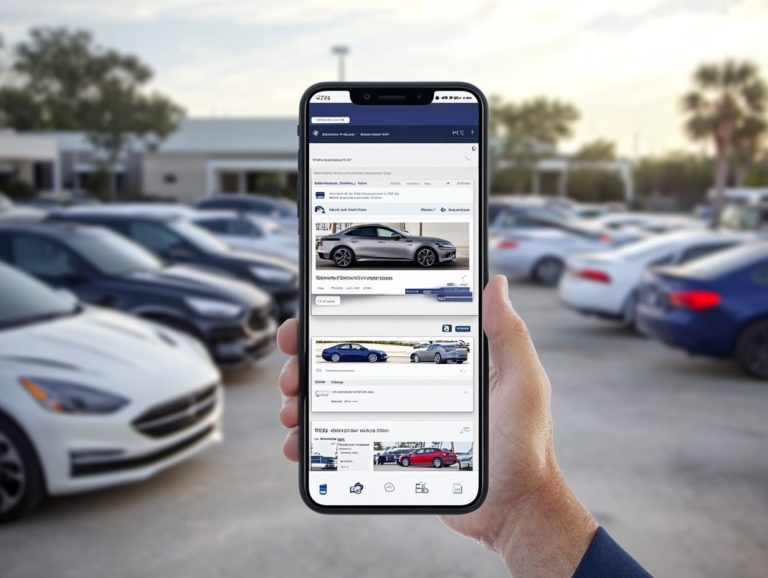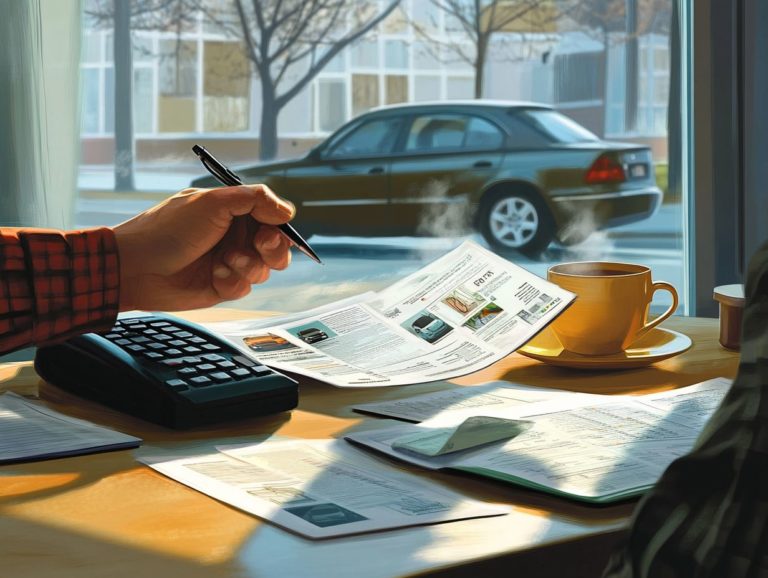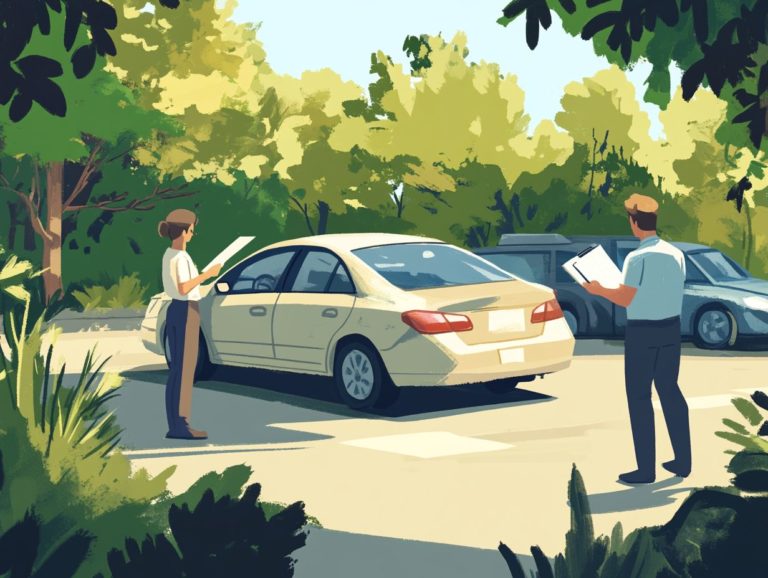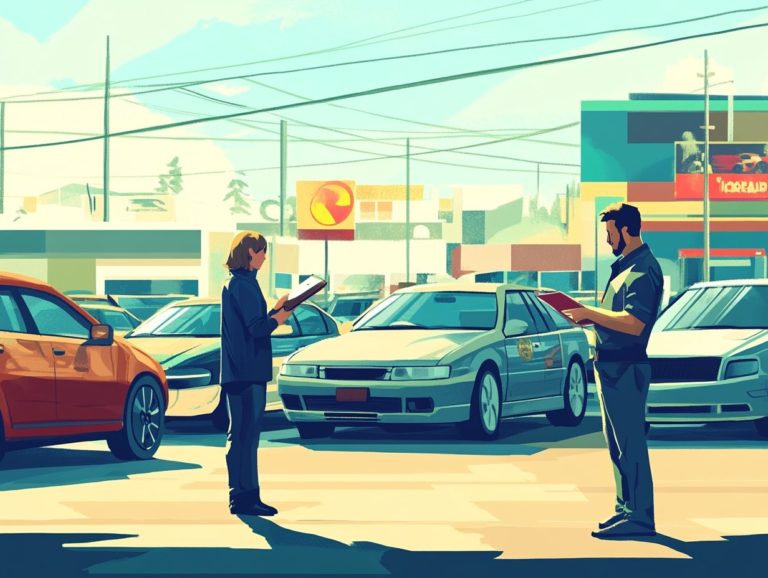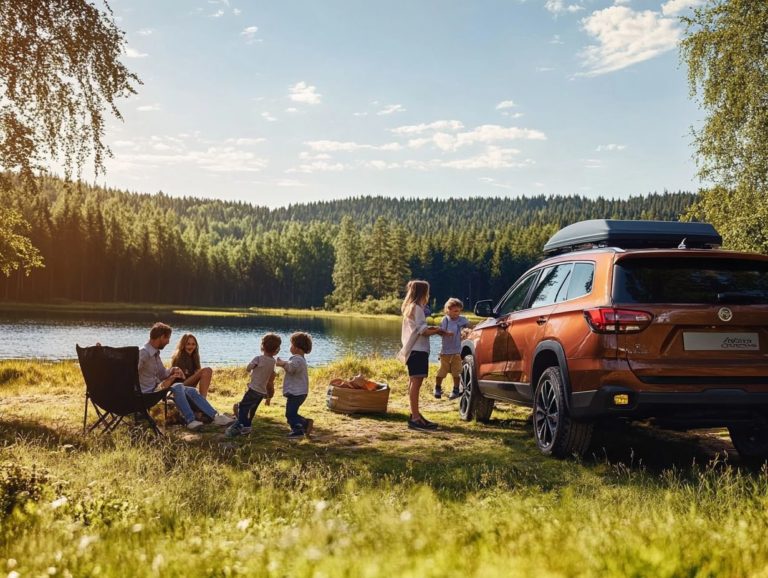The Pros and Cons of Buying Used Cars
Purchasing a vehicle can feel like a thrilling adventure. However, choosing to buy used might leave you feeling a bit overwhelmed.
Used cars offer enticing savings and a wide variety of options, but they come with challenges like uncertain vehicle histories and potential maintenance costs. Navigating this landscape requires careful assessment of your budget, evaluation of the car’s condition, and thorough research.
This article explores the pros and cons of buying used cars, highlighting essential factors to consider beforehand and offering practical tips to ensure that your purchase is a wise one.
Contents
- Key Takeaways:
- The Advantages of Buying Used Cars
- The Disadvantages of Buying Used Cars
- Factors to Consider Before Buying a Used Car
- Tips for Buying a Used Car
- Frequently Asked Questions
- What are the potential advantages of buying a used car?
- What are the potential drawbacks of buying a used car?
- Is it more financially beneficial to buy a used car compared to a new one?
- What should I consider when buying a used car?
- How can I ensure I am making a good purchase when buying a used car?
- What are the extra costs when buying a used car?
Key Takeaways:

- Save money by buying a used car with lower costs and depreciation.
- Consider potential maintenance costs and uncertainty of vehicle history.
- Before purchasing, research, inspect, negotiate for the best price, and get a vehicle history report.
The Advantages of Buying Used Cars
Buying a used car has numerous advantages, especially for those on a budget who want to optimize their financial investments. Opting for a pre-owned vehicle often means significant cost savings compared to new models.
With lower purchase prices and less depreciation, you can relieve financial strain over time. Many used cars come with certification and warranties, giving you peace of mind through manufacturer guarantees and rigorous inspections.
This blend of affordability and quality makes buying used cars an appealing choice for savvy car buyers seeking value without compromising on essential safety features and technological advancements.
Cost Savings
One compelling reason to consider purchasing a used car is the significant cost savings compared to new vehicles. This benefit is evident in lower monthly payments: while the average monthly payment for a new car exceeds $600, you can often find a reliable used vehicle for around $300.
Insurance costs are usually much lower for used cars, with estimates suggesting savings of up to 20% or more, depending on the model and age of the vehicle. Additionally, fewer dealership fees associated with new car purchases can further enhance the budget-friendly nature of the transaction.
You can save hundreds just on registration and licensing fees. By opting for a used vehicle, you can enjoy the open road while keeping your budget healthy.
Lower Depreciation
Lower depreciation is another strong advantage of purchasing used cars, as they typically retain their value better than new vehicles. New cars experience the steepest depreciation in their first few years, often losing about 20% to 30% of their value within the first year.
For those looking to make a smart investment, choosing a used vehicle can lead to less financial loss over time. By selecting a model that has already gone through its biggest drop in value, you can achieve a better resale price when it s time to sell or trade in.
Choosing wisely can save you money and boost your budget for other fun things while still enjoying reliable transportation.
More Options Available
Buying a used car opens a world of possibilities, giving you access to an impressive array of models, makes, and price points. This extensive selection ranges from budget-friendly sedans to luxurious high-end vehicles, catering to various tastes and financial situations.
Whether you’re an enthusiast in search of advanced technology, safety features, or custom modifications, you ll find plenty to choose from. In this diverse marketplace, you can discover cars that meet your everyday needs and elevate your driving experience be it a fuel-efficient compact or a fully-loaded SUV packed with the latest infotainment systems.
This variety allows you to select a vehicle that aligns perfectly with your lifestyle and unique desires.
Start your search for a used car today! Check local listings or visit a dealership to find the perfect match for you.
The Disadvantages of Buying Used Cars

When considering the purchase of a used car, you ll encounter many benefits, but it’s equally important to weigh the considerable disadvantages that may arise before making a commitment.
Beware of Hidden Repair Costs!
One significant drawback of purchasing used cars is the likelihood of facing higher maintenance costs as the vehicle ages. These costs can be high and may surprise buyers, disrupting their financial plans.
For example, common repairs like brake replacements, transmission work, or engine issues can spring up unexpectedly, leading to bills that can soar into the thousands. You might find a used car at an enticing price, but if you’re not prepared for potential repairs, it could throw a wrench in your budgeting efforts.
It s essential to set aside money for repairs. By understanding the vehicle’s history and any model-specific issues, you can gain valuable insight into what repairs might be on the horizon, enabling you to make more informed financial decisions.
Uncertainty of Vehicle History
The uncertainty surrounding a used car’s history can pose a considerable challenge, as hidden issues may not become evident during the buying process.
To navigate this complex landscape, you can utilize a range of resources designed to provide you with detailed vehicle history information. Services like Carfax and AutoCheck compile extensive reports that cover everything from past accidents and title changes to service history and maintenance records.
Getting an inspection report from a trusted mechanic adds protection, helping you uncover any underlying issues that might not show up in those digital reports. A lack of transparency can significantly influence your buying decision, often leading to costly surprises down the line.
Therefore, conducting thorough research is essential to ensure that your investment in a used vehicle is both sound and well-informed. Act now to safeguard your investment!
Factors to Consider Before Buying a Used Car
When you re considering the purchase of a used car, several critical factors demand your attention to ensure that you make a wise investment and enjoy a satisfying driving experience.
Budget and Needs
Establishing a clear budget and understanding your individual needs is essential before buying a used car, as these factors directly influence your decisions.
A discerning approach to budget limitations can greatly enhance your buying experience, allowing you to filter options that really fit your financial situation.
By determining what you can afford, you can prioritize essential features and avoid unnecessary expenses. It’s crucial to consider not only the purchase price but also ongoing costs like insurance, fuel, and maintenance.
By setting realistic expectations and conducting a thorough assessment of total ownership costs, you can navigate the used car market more effectively, ensuring a satisfying purchase that aligns with your lifestyle and financial aspirations.
Is the Car in Good Shape?

Evaluating the condition of a car is essential when considering a used vehicle; it can greatly influence both maintenance costs and your overall buying experience.
A comprehensive evaluation requires you to scrutinize various elements, such as the exterior condition, tire wear, and the functionality of key components like brakes and lights. Don t overlook the car s interior either pay attention to upholstery wear and tear, as well as the overall cleanliness of the vehicle.
Just as crucial is understanding the car’s previous maintenance and repair history. This information can reveal whether the vehicle has received regular servicing or if there are hidden issues that could lead to costly repairs later on.
By being diligent in these areas, you can make a more informed decision and potentially sidestep future headaches. Don t wait ensure you know what you’re buying!
Research and Inspection
Conducting thorough research and a thorough check is essential when you re in the market for a used car. This care can show potential maintenance costs and the vehicle’s history that you might otherwise overlook.
By utilizing resources like Kelley Blue Book, a trusted car pricing guide that helps you understand fair values, and Vinaudit, you can uncover invaluable insights into market value and the vehicle s background, enabling you to make a more informed decision.
Arranging for a professional inspection can highlight underlying mechanical issues that may not be visible at first glance. This approach helps you avoid extra costs and makes buying more enjoyable.
You ll drive away with confidence, knowing you ve made a wise investment that aligns perfectly with your expectations and budget.
Tips for Buying a Used Car
Successfully navigating the used car market demands a blend of strategic thinking and practical insights. Equip yourself with the right approaches to ensure a rewarding purchase while steering clear of common pitfalls that can derail your experience.
Negotiating Price
Negotiating the price of a used car is an invaluable skill that can yield significant savings and lead to a wiser financial choice. By refining this skill, you can confidently navigate the often daunting world of auto sales.
Start your negotiation with thorough research into market values, ensuring you are well-informed about similar vehicles in your area. Understanding the various dealership fees, such as documentation or preparation charges, can also give you an edge. For instance, arriving equipped with information about a competing offer can create a sense of urgency for the seller.
Employing a straightforward tactic remaining polite yet assertive can foster a more cooperative interaction, ultimately paving the way for a deal that leaves both parties satisfied.
Getting a Vehicle History Report
Obtaining a vehicle history report is an essential step in your used car buying journey, showing problems that might not be easy to see.
When you’re in the market for a pre-owned vehicle, accessing reports from reputable sources like Carfax and AutoCheck can enable you to make well-informed decisions. These reports typically unveil vital details about past accidents, title status, odometer readings, and even historical service records.
By providing a comprehensive overview of the car s history, these reports allow you to accurately gauge its condition and value. They act as a protective measure against deceptive practices, instilling you with the confidence needed to invest in a reliable vehicle that meets your expectations.
Taking a Test Drive

Don t skip the test drive! It s your chance to feel how the car performs and evaluate the driving experience and overall vehicle performance before making a commitment.
During this pivotal moment, you can assess how well the vehicle aligns with your specific needs and preferences. It s crucial to focus on comfort testing the seating position and interior space can reveal a lot about your long-term satisfaction.
Handling matters too; by evaluating how the car responds to turns and brakes, you ll ensure it meets your expectations.
Also, keep an ear out for any unusual sounds or behaviors during the drive; these can provide valuable insights into the car s condition, potentially saving you from future headaches and unexpected expenses.
So, get behind the wheel and discover if this is the car for you!
Frequently Asked Questions
What are the potential advantages of buying a used car?
Some of the main pros of buying a used car include lower cost, less depreciation, and a wider selection of models and features.
What are the potential drawbacks of buying a used car?
Some potential cons of buying a used car include a shorter lifespan, potential for hidden issues or damage, and limited warranty options.
Is it more financially beneficial to buy a used car compared to a new one?
In most cases, buying a used car can save you money in the long run due to a lower purchase price and slower depreciation.
What should I consider when buying a used car?
Important factors to consider when buying a used car include the car’s age, mileage, maintenance history, and any potential issues or damage.
How can I ensure I am making a good purchase when buying a used car?
To make a smart choice, research is key. Inspect the car thoroughly and take it for a test drive.
Having a mechanic check the car can also be very helpful. Their expertise can save you from future headaches.
What are the extra costs when buying a used car?
The purchase price isn’t the only thing to consider. You might also face sales tax, registration fees, and potential repairs.
Make sure to budget for these extra costs. Planning ahead can help you avoid surprises.


